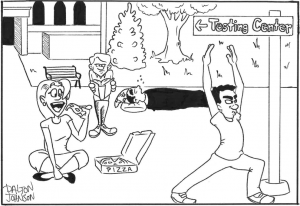
Exam preparation typically includes studying class materials or textbooks, but some students place special emphasis on nontraditional pre- and post-test rituals.
Students at Brigham Young University, Brigham Young University-Idaho and Utah Valley University may be enrolled in similar classes, but their test-taking experiences differ greatly.
Kurtis Murray, a junior studying accounting at BYU, always makes the 64-mile drive home to Kaysville before a major test. If he doesn’t have to take the test right away, he’ll even spend the night there.
His parents don’t live in the house, so it is an escape from a busy apartment. “It’s more comfortable, and I study better because it’s a silent, empty house,” Murray said.
He added that he has had this tradition since his very first semester. When circumstances don’t allow Murray to go to Kaysville, he said, he feels “more stressed and tense” about the upcoming exam. He also said he feels like his pre-test ritual definitely has a positive impact on his testing experience.
UVU student Melissa Braithwaite has a different approach to test-taking. She typically pulls an all-nighter before each of her exams. “I end up having to dance around to stay awake,” she said. Braithwaite mentioned that her dance moves are supported by a special playlist she makes for studying.
Braithwaite also goes out to eat after every test to treat herself. She said this is a tradition regardless of whether she got a good score on the exam or not.
Hannah Colvin, a student at BYU-Idaho, said that after taking a test she never checks the score on the screen outside the testing center. “People are all around, and you can usually tell whether people do good or bad,” she said. “I’d rather see the score in private.”
Colvin usually waits at least a day before checking her score online. She said this doesn’t add any extra anxiety. In fact, she said, it helps her wind down after taking a test. “People are happy if they get a good score, or they’re sad and depressed if they didn’t do well. I just avoid all of that and check my score later,” she said.
Clinical psychologist Lynne Bennion said while the majority of pre- and post-test rituals are harmless, behavior can be considered compulsive when it interferes with one’s ability to function. If students are concerned about whether or not their behavior is compulsive, Bennion suggested that they experiment not doing the ritual, to see how giving it up affects their stress or anxiety.
She also talked about the superstition that a ritual can take the place of good study habits. “It’s okay to continue wearing your favorite sweatshirt to the testing center, but you can also explore resources for BYU students,” Bennion said.
Bennion mentioned the BYU Career and Academic Success Center, and the Stress Management and Biofeedback Services as two potential options for students who may be feeling that they need additional help preparing for exams or managing their stress.




